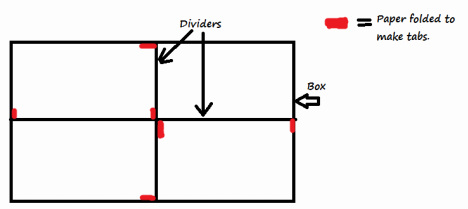Having an idea box - that is, a place where you can store all that excess stuff that you aren't using currently in your novel/story/poem etc. - is a little like having a second brain.
This activity can be used in a writing group meeting, and will be advantageous to all group members because, by the end, everyone will have their very own idea box.
Here are the steps to follow:
1. Find a small to medium sized box, such as a shoe box, or a tissue box. If you use a tissue box, cut out the top.
2. Divide the box into four sections. One way to do this (feel free to come up with your own) is to take a piece of paper that is a little longer than the width of your box, and fold both ends to make tabs. Then, glue the tabs to the side of your box, leaving a divider down the middle. Then, to make it into four sections, get two other pieces of paper that are a little longer than the distance between the first divider and the other two walls. Then, glue the other dividers so that they make a "T" between the first divider and the wall. When you're finished, the inside of the box will look a little like this:
This activity can be used in a writing group meeting, and will be advantageous to all group members because, by the end, everyone will have their very own idea box.
Here are the steps to follow:
1. Find a small to medium sized box, such as a shoe box, or a tissue box. If you use a tissue box, cut out the top.
2. Divide the box into four sections. One way to do this (feel free to come up with your own) is to take a piece of paper that is a little longer than the width of your box, and fold both ends to make tabs. Then, glue the tabs to the side of your box, leaving a divider down the middle. Then, to make it into four sections, get two other pieces of paper that are a little longer than the distance between the first divider and the other two walls. Then, glue the other dividers so that they make a "T" between the first divider and the wall. When you're finished, the inside of the box will look a little like this:
3. Now, create labels for each of the sections and glue them to the bottom of the box. You can have whatever sections you want, but here are a few I recommend:
Characters - In this section you can include names, character profiles for characters that you've taken out of your stories (or characters that are in you stories and you need a place to store the profiles!), metaphors to describe your character's appearance, and any activities that you've done to get to know your characters better.
Words and Description - You can store your words of the day, and other words you find interesting here. You can also put pieces of description that you've written, as well as metaphors and similes you've thought of.
Setting - Here you can put setting descriptions and places you want to set stories in the future.
Ideas/Miscellaneous - This is one of the most important sections. This is for when you come up with those brilliant ideas for books, titles, or anything else related to your writing. Then, when you're looking for something new to work on, you can go to this section of the box and write about one of the ideas you have in here. Also, you can put things in here that don't fit into the other categories.
Now, cut up some pieces of scrap paper into small rectangles, and find a pen or pencil to keep in your box. Then, when you get an idea, grab a little piece of paper and write it down, then put it in the appropriate section of the box.
Enjoy your idea box!
-M
Characters - In this section you can include names, character profiles for characters that you've taken out of your stories (or characters that are in you stories and you need a place to store the profiles!), metaphors to describe your character's appearance, and any activities that you've done to get to know your characters better.
Words and Description - You can store your words of the day, and other words you find interesting here. You can also put pieces of description that you've written, as well as metaphors and similes you've thought of.
Setting - Here you can put setting descriptions and places you want to set stories in the future.
Ideas/Miscellaneous - This is one of the most important sections. This is for when you come up with those brilliant ideas for books, titles, or anything else related to your writing. Then, when you're looking for something new to work on, you can go to this section of the box and write about one of the ideas you have in here. Also, you can put things in here that don't fit into the other categories.
Now, cut up some pieces of scrap paper into small rectangles, and find a pen or pencil to keep in your box. Then, when you get an idea, grab a little piece of paper and write it down, then put it in the appropriate section of the box.
Enjoy your idea box!
-M

 RSS Feed
RSS Feed